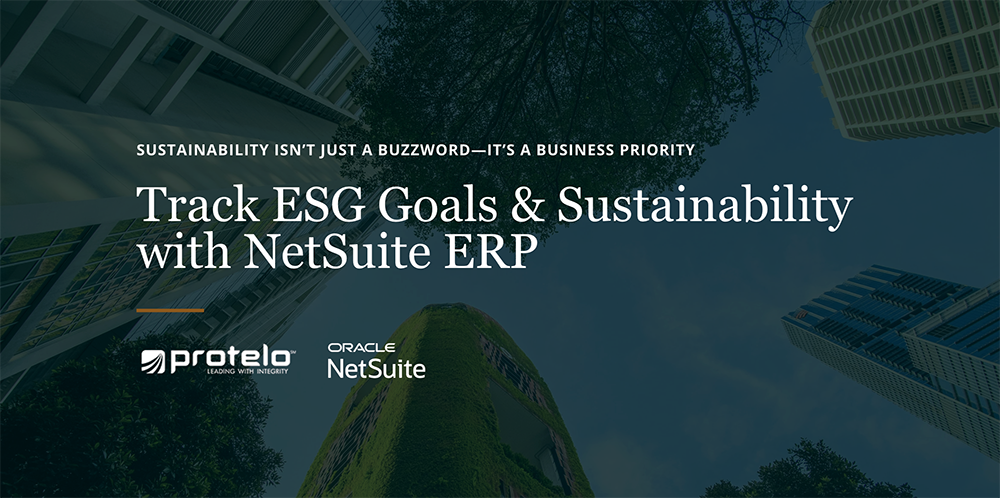What Is ESG and Why Does It Matter in ERP?
ESG refers to a broad set of criteria used to measure a company’s sustainability and ethical performance. These indicators go beyond profit to include environmental impact, social responsibility, and governance practices.
NetSuite ERP plays a key role in ESG tracking by centralizing the financial and operational data required for reporting.
With an ERP system designed for ESG, businesses can:
- Monitor energy use, emissions, and material waste
- Track DEI initiatives and workforce trends
- Improve supply chain visibility and reduce ESG risks
- Connect ESG metrics to financial performance
- Support audits with integrated data trails
ESG and Sustainability in ERP: A Built-In Advantage
Most companies struggle with ESG data because it lives in spreadsheets, isolated systems, or disconnected departments. By embedding ESG and sustainability tracking into your ERP, your company gains:
With an ERP system designed for ESG, businesses can:
- Integrated ESG metrics within daily workflows
- Real-time visibility across departments and locations
- Fewer reporting errors and reduced administrative burden
- Automated data collection from business operations
- A clear audit trail for ESG reporting
This built-in approach reduces manual work and supports smarter, faster decisions.
NetSuite ESG Features That Drive Impact
NetSuite offers several capabilities designed to support ESG strategies and sustainability goals.
1. Sustainability Dashboards
These dashboards give you a single view of ESG metrics, covering everything from carbon footprint to workforce diversity. You can tailor dashboards to leadership, operations, or compliance teams to keep everyone aligned.
2. Supply Chain ESG Risk Management
Use vendor and product data to evaluate ESG risk. NetSuite helps track environmental and labor-related issues at the source and manage supplier certifications, locations, and sustainability standards.
3. ESG in Financial Planning
NetSuite links ESG and financial data, so you can forecast how sustainability initiatives affect revenue, cost savings, or ROI. Whether it’s green infrastructure, eco-packaging, or workforce wellness programs, you’ll see the full picture.
Why ESG Reporting Frameworks Matter
To meet evolving regulations and stakeholder expectations, businesses need to follow established ESG frameworks such as:
- Global Reporting Initiative (GRI)
- Sustainability Accounting Standards Board (SASB)
- Corporate Sustainability Reporting Directive (CSRD)
NetSuite helps companies align with these standards while minimizing manual effort. ESG reporting with NetSuite becomes faster, more accurate, and more defensible—especially during audits or investor reviews.
Benefits of Using NetSuite for ESG Tracking
Companies using NetSuite for ESG see more than just compliance gains—they improve internal performance and build brand trust.
Key benefits include:
- Centralized ESG and financial data
- Improved data integrity and audit readiness
- Real-time KPIs for sustainability performance
- Transparent reporting for internal and external stakeholders
- Long-term support for sustainability initiatives
NetSuite offers the flexibility to scale your ESG program as your business grows.
What ESG Metrics Should You Be Tracking in ERP?
Not sure where to begin? NetSuite makes it easier to define ESG goals and track what matters most.
Examples of ESG metrics you can monitor in ERP include:
- Environmental: Energy use, greenhouse gas emissions, water consumption, waste by products
- Social: Workforce diversity, employee engagement, community outreach hours, safety incidents
- Governance: Board diversity, ethics training completion, supplier compliance, audit outcomes
You can customize these metrics and connect them directly to your business KPIs.
Get the ESG Tools You Need - Without the Complexity
Managing ESG doesn’t have to be overwhelming. Integrating ESG into your ERP breaks down silos, improves transparency, and helps you align decisions with both values and profitability.
Let Protelo show you how ESG and NetSuite ERP can work together to build a stronger, more sustainable business.
Ready to align ESG with your operations?
Talk to our team about how we can help your business implement ESG tracking and sustainability initiatives using NetSuite.




